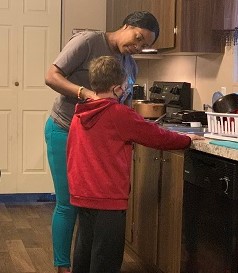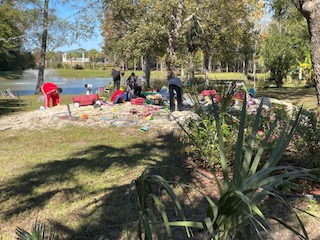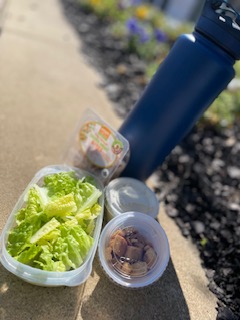Food is a topic we can all relate to, whether it’s the love of eating or the struggle to eat healthier. Because March is National Nutrition Month, our focus at Seraaj Family Homes, Inc. is how to combat childhood obesity, address food-related trauma, and help our remote workers stay healthy while out in the field providing the best human services.
Children and youth in foster care often have a

Eating disorders can be triggered by emotional, physical, or sexual abuse. (Pic by Annie Spratt on Unsplash)
background or history of food-related trauma. Their background might include previous food insecurity, difficulty making healthy food choices may be due to poor nutritional education, or an income status that made it difficult to purchase healthier food due to cost. The impact of these traumas might never go away and can continue through adulthood, according to Dr. Nadine Burke-Harris, a pediatrician and the first Surgeon General of California. Even more seriously, children who were victims of sexual abuse have also been known to have food-related illnesses and disorders as part of their trauma, according to a 2008 study that “examined the relationship between childhood sexual abuse before the age of 16” in girls and women.
Food Related Issues for Foster Youth
Research by Dr. Harris explains childhood trauma can impact children for the duration of their lives and cause health problems well into adulthood. Food insecurity, food disorders, and food-related traumas can present in the form of health-related illnesses like obesity, eating disorders, and malnutrition.
Eating disorders like bulimia nervosa, anorexia nervosa, and binge eating disorder are all conditions that could stem from food-related trauma. Therefore, it is important for caregivers to be educated in food and nutrition issues and behaviors when caring for youth in foster care. Many times, these issues have signals and warning signs that can be seen and require individual therapy.

Allow children to become a part of the family nutrition and meal planning. This will give them a sense of responsibility and collaboration.
Although it seems like making healthy food choices is a matter of just doing it, for some people, food choices and maintaining a healthy lifestyle are more than just a choice. People’s food choices can be a result of trauma that people are fighting caused by something that may not even be related to food. As well as physical illness, you may see some behavioral issues related to food from many youths in foster care. These include stealing and hoarding food, rejecting food, and self-harm or mutilation.
Working Healthy
Our staff is the majority comprised of remote employees. Many of us are on the go constantly and must make quick decisions about what to eat, and sometimes when to eat. Our days are sometimes planned, and occasionally that plan can be completely derailed in the event of a crisis. These are the times we must have a backup plan for how to eat healthy to keep up with as many good habits as we can.
Our COO Akmal Saleem, who is retired military personnel and stickler for healthy living, offers this advice on staying healthy as a remote employee. He combines his health into three categories:
- Mind (always seeking knowledge) – Read and study your library, add to your wealth of knowledge, and spend time with your books and materials in quiet study.
- Body (constant motion) – Stay moving in your downtime especially. When you are a remote employee, it is important to keep moving, and this helps burn energy and calories.
- Soul (firm belief and spiritual guidance) – Take time to meditate and relax and reflect on your day. Having time reserved for spiritual reflection helps you regain focus.
Saleem says he (1) IDENTIFIES which category he is focusing on, (2) SETS his goals, (3) PREPARES for the task, (4) PLANS for success or positive gains, and (5) ACTS or gets moving. He also suggests “replenishing your body with healthy food, hydrating with lots of water, and getting good rest without distraction.”
Proper planning of your lunch, breaks, and snacks are great techniques to stay on top of your food and health challenges that you are sure to face while working on the go or remotely. Do not think that you won’t face these challenges in the comfort of your own home, as well.
Imagine sitting in a long training and the only thing available for lunch is leftover spaghetti. This may be great for your mood as a comfort treat, but maybe not so great for your energy level. Having salads on hand and low-carb, high-energy snacks like fresh fruit, nuts, and protein bars will keep you away from last night’s leftovers until your workday is over or until you become mobile enough in your daily tasks to burn that fuel. Bonus tip: Don’t be afraid to jump on a treadmill while working or using a good, ole’ fashion jump rope in a virtual meeting!
Food Choice Is for Everyone
Eating correctly and making good choices for your overall health and wellness can be tough. It takes time to consider what are good choices for your body and why we should avoid certain things. Adults are often tempted by convenient options, and children are often pressured by peers to indulge in “fun foods” like pizza, soda, and chips. Children can also be provided with unhealthy options by guardians and their elders, especially when their providers are lacking in food education.
Saleem stays busy by participating in various recreational activities with his grandsons and many of our foster youth. He believes strongly in the philosophy that energy burned outdoors and in play therapy is great for your overall health and well-being. Saleem instills this in our remote workers in training and reminds everyone to be creative and take therapy “back to the basics” by using balls, fishing, running, playgrounds, and making sure we are ready with our sneakers to get involved with the kids at any time.

Playing in nature and having a recreational outlet is good for all ages and is key to healthy dietary nutrition.
Whether it’s through our plate or through our therapy sessions, we all should consider what we are putting in our bodies as nourishment. It is true that “we are what we eat.” If we are consuming good things, our bodies will process them more easily and give us back great energy and other health benefits like painless joints and clearer skin. So, be good to our souls, minds, and bodies.


